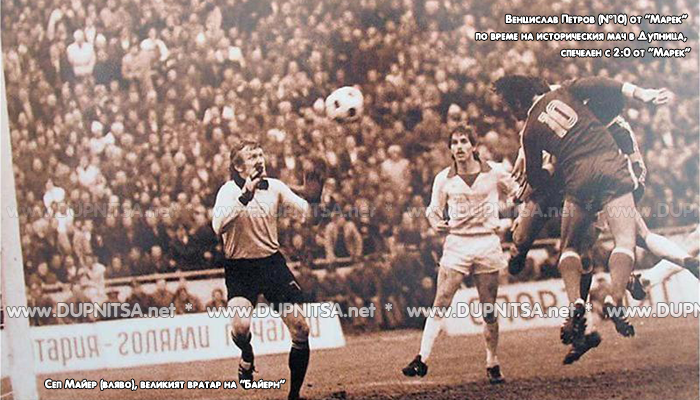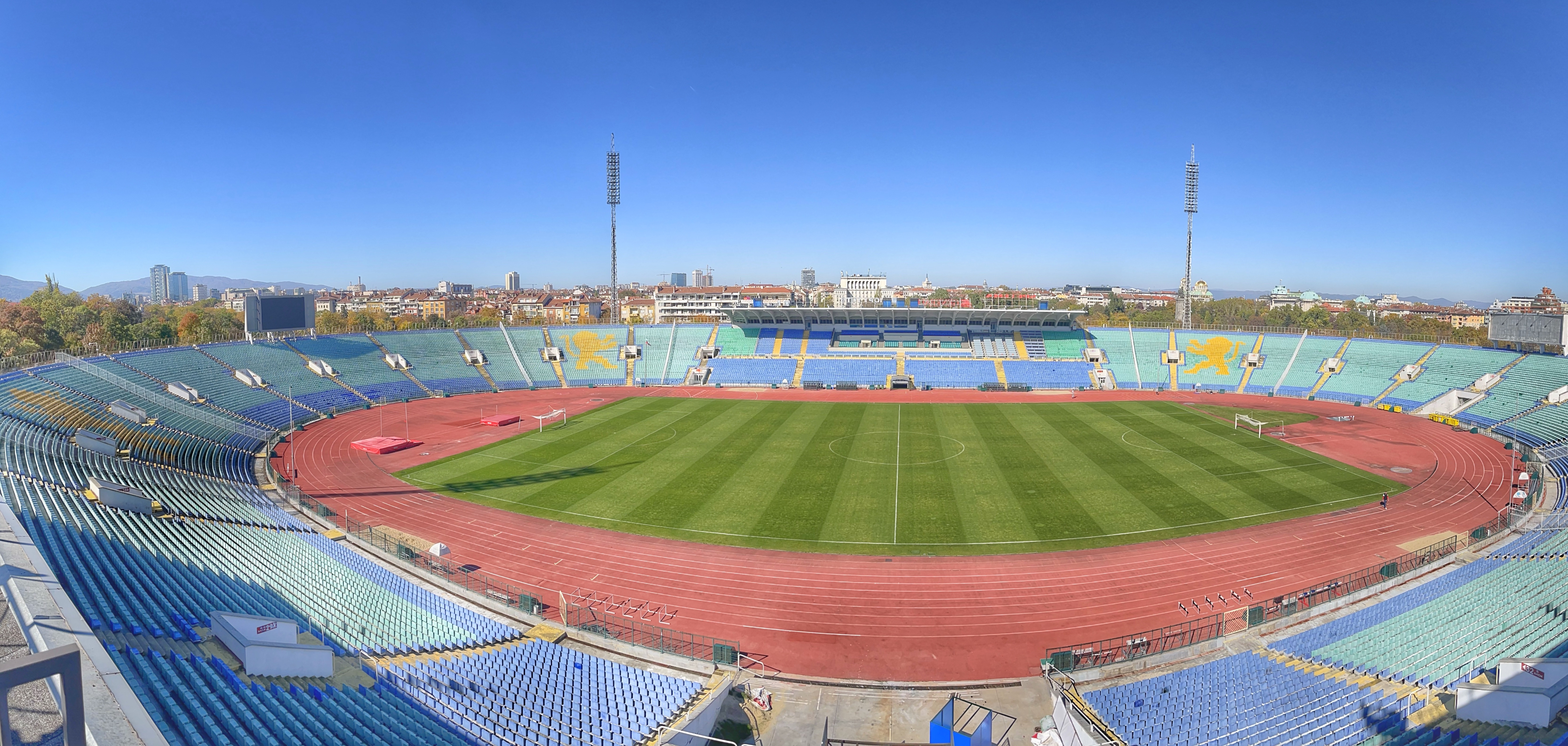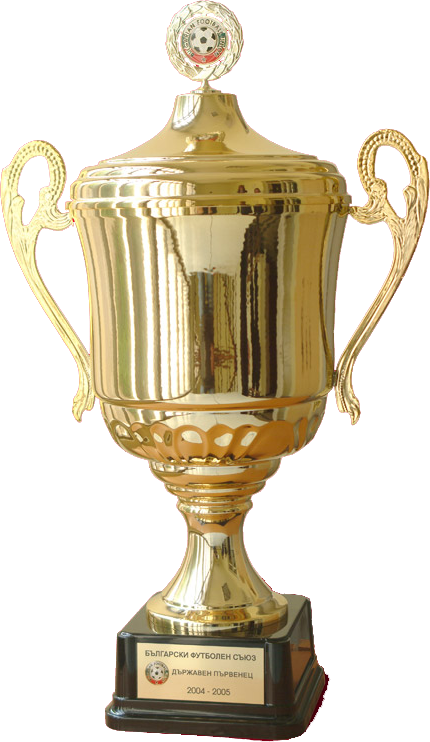|
PFC Marek Dupnitsa
FC Marek ( bg, ФК Марек) is a Bulgarian football club based in Dupnitsa, currently playing in the Third League, the third level of the Bulgarian football league system. It was founded in 1947 following the unification of four local clubs. Home matches take place at Bonchuk Stadium, where Marek famously defeated Bayern Munich in 1977. Bonchuk stadium has a capacity of 16,000. The team last played top-flight football during the 2014–15 season. Marek's greatest achievement is winning the 1978 Bulgarian Cup. Honours ; Domestic First League: * Third place (2): 1948, 1977 Second League: * Winners (1): 2014 Bulgarian Cup: * Winners (1): 1978 History Early history (1919–1947) The people of Dupnitsa watched football being played for the first time by foreign troops stationed in the city during World War I. Over the next several years, four clubs were founded in the city: Slavia, Levski, ZHSK, and Athletic. In 1923, these clubs participated in the formation of the Sout ... [...More Info...] [...Related Items...] OR: [Wikipedia] [Google] [Baidu] |
Stadion Bonchuk
Stadion Bonchuk ( bg, Стадион „Бончук", en, 'Bonchuk Stadium' ) is a multi-use stadium in Dupnitsa, Bulgaria. It is used mostly for football matches and is the home ground of Marek Dupnitsa. The stadium has seating capacity for 16,050 people. Bonchuk stadium is a notable one in Bulgarian football, as it has hosted many notable European teams, including German giants Bayern Munich, Scottish team Aberdeen, and Hungarian powerhouse Ferencvárosi TC Ferencvárosi Torna Club, known as Ferencváros (), Fradi, or simply FTC, is a professional football club based in Ferencváros, Budapest, Hungary, that competes in the Nemzeti Bajnokság I, the top flight of Hungarian football. Ferencváro .... All of these games ended with wins for Marek. External links StadiumDB pictures Football venues in Bulgaria Dupnitsa Buildings and structures in Kyustendil Province {{Bulgaria-sports-venue-stub ... [...More Info...] [...Related Items...] OR: [Wikipedia] [Google] [Baidu] |
Vasil Levski National Stadium
Vasil Levski National Stadium ( bg, Национален стадион „Васил Левски“), named after Bulgarian national hero and revolutionary Vasil Levski (1837–1873), is the country's second largest stadium. The stadium has 43,230 seats and is located in the centre of Sofia, on the territory of the city's oldest and most famous park - the Borisova gradina. The Bulgaria national football team's home matches and the Bulgarian Cup finals are held at the venue, as well as athletics competitions. It was used as the home venue for Levski Sofia's Champions League games, and is often used for important derbies between the big clubs from Sofia, instead of their own home stadiums. History Vasil Levski National Stadium was officially opened in 1953, extended in 1966 and renovated in 2002. Prior to their demolition by the Communist authorities during the 1940s and 50s, two other stadiums stood on the ground where the current national stadium lies. One of those was Lev ... [...More Info...] [...Related Items...] OR: [Wikipedia] [Google] [Baidu] |
PFC CSKA Sofia
CSKA Sofia ( bg, ЦСКА София) is a Bulgarian professional association football club based in Sofia and currently competing in the country's premier football competition, the First League. ''CSKA'' is an abbreviation for ''Central Sports Club of the Army'' ( bg, Централен Спортен Клуб на Армията). Officially established on 5 May 1948, CSKA's roots date back to an army officers' club founded in 1923. The club has won a record 31 Bulgarian titles and 21 Bulgarian Cups. Internationally, CSKA are the only Bulgarian club to have reached the semi-finals of the European Cup, which they have done twice, and they have also reached the semi-final of the UEFA Cup Winners' Cup once. CSKA's home colors are red and white and its home ground is the Bulgarian Army Stadium. The club's biggest rivals are Levski Sofia and matches between the two sides are known as " The Eternal Derby of Bulgaria". History 1923–1948 In November 1923, football clubs ' ... [...More Info...] [...Related Items...] OR: [Wikipedia] [Google] [Baidu] |
B PFG
The Bulgarian Second Professional Football League ( bg, Втора професионална футболна лига, Vtora Profesionalna Futbolna Liga), also known as Second League ( bg, Втора Лига) or Vtora liga, is the second level of the Bulgarian football league system, below First League and above the Third League. Sixteen teams take part in the league, each playing twice against all the other, once home and once away. Most matches are played on Saturdays and Sundays. The league is administered by the Bulgarian Professional Football League. In 2016, the B Group's name was rebranded to Second Professional Football League. Competition format A team receives 3 points for a win and 1 point for a draw. No points are awarded for a loss. Promotion and relegation positions For 2021–22 Season : * ''First place'' (champion) to ''Third place'': Direct promotion to First Professional Football League. * ''Fourth place'': Promotion playoff against the 13th place team ... [...More Info...] [...Related Items...] OR: [Wikipedia] [Google] [Baidu] |
A PFG 1948–49
A, or a, is the first letter and the first vowel of the Latin alphabet, used in the modern English alphabet, the alphabets of other western European languages and others worldwide. Its name in English is ''a'' (pronounced ), plural ''aes''. It is similar in shape to the Ancient Greek letter alpha, from which it derives. The uppercase version consists of the two slanting sides of a triangle, crossed in the middle by a horizontal bar. The lowercase version can be written in two forms: the double-storey a and single-storey ɑ. The latter is commonly used in handwriting and fonts based on it, especially fonts intended to be read by children, and is also found in italic type. In English grammar, " a", and its variant " an", are indefinite articles. History The earliest certain ancestor of "A" is aleph (also written 'aleph), the first letter of the Phoenician alphabet, which consisted entirely of consonants (for that reason, it is also called an abjad to distinguish it fr ... [...More Info...] [...Related Items...] OR: [Wikipedia] [Google] [Baidu] |
Bulgarian A PFG
The First Professional Football League ( bg, Първа професионална футболна лига, Parva Profesionalna Futbolna Liga), also known as the Bulgarian First League or Parva Liga, currently known as the efbet League for sponsorship reasons, is a professional association football league, located at the top of the Bulgarian football league system. Contested by 16 teams, it operates on a system of promotion and relegation with the Second Professional Football League. The Bulgarian football championship was inaugurated in 1924 as the ''Bulgarian State Football Championship'' and has been played in a league format since 1948, when the A Group was established. The champions of the First League have the right to participate in the qualifying rounds of the UEFA Champions League based on the league's European coefficient. Additionally, two UEFA Europa League spots are allocated to the second team in the final standings and the winner of the European playoffs. A ... [...More Info...] [...Related Items...] OR: [Wikipedia] [Google] [Baidu] |
Emigrant
Emigration is the act of leaving a resident country or place of residence with the intent to settle elsewhere (to permanently leave a country). Conversely, immigration describes the movement of people into one country from another (to permanently move to a country). A migrant ''emigrates'' from their old country, and ''immigrates'' to their new country. Thus, both emigration and immigration describe migration, but from different countries' perspectives. Demographers examine push and pull factors for people to be pushed out of one place and attracted to another. There can be a desire to escape negative circumstances such as shortages of land or jobs, or unfair treatment. People can be pulled to the opportunities available elsewhere. Fleeing from oppressive conditions, being a refugee and seeking asylum to get refugee status in a foreign country, may lead to permanent emigration. Forced displacement refers to groups that are forced to abandon their native country, such as by en ... [...More Info...] [...Related Items...] OR: [Wikipedia] [Google] [Baidu] |
Revolutionary
A revolutionary is a person who either participates in, or advocates a revolution. The term ''revolutionary'' can also be used as an adjective, to refer to something that has a major, sudden impact on society or on some aspect of human endeavor. Definition The term—both as a noun and adjective—is usually applied to the field of politics, but is also occasionally used in the context of science, invention or art. In politics, a revolutionary is someone who supports abrupt, rapid, and drastic change, usually replacing the status quo, while a reformist is someone who supports more gradual and incremental change, often working within the system. In that sense, revolutionaries may be considered radical, while reformists are moderate by comparison. Moments which seem revolutionary on the surface may end up reinforcing established institutions. Likewise, evidently small changes may lead to revolutionary consequences in the long term. Thus the clarity of the distinction between rev ... [...More Info...] [...Related Items...] OR: [Wikipedia] [Google] [Baidu] |
Antifascist
Anti-fascism is a political movement in opposition to fascist ideologies, groups and individuals. Beginning in European countries in the 1920s, it was at its most significant shortly before and during World War II, where the Axis powers were opposed by many countries forming the Allies of World War II and dozens of resistance movements worldwide. Anti-fascism has been an element of movements across the political spectrum and holding many different political positions such as anarchism, communism, pacifism, republicanism, social democracy, socialism and syndicalism as well as centrist, conservative, Liberalism, liberal and nationalist viewpoints. Fascism, a far-right ultra-nationalistic ideology best known for its use by the Italian Fascists and the Nazism, Nazis, became prominent beginning in the 1910s while organization against fascism began around 1920. Fascism became the state ideology of Italy in 1922 and of Germany in 1933, spurring a large increase in anti-fascist action ... [...More Info...] [...Related Items...] OR: [Wikipedia] [Google] [Baidu] |
Marxist
Marxism is a left-wing to far-left method of socioeconomic analysis that uses a materialist interpretation of historical development, better known as historical materialism, to understand class relations and social conflict and a dialectical perspective to view social transformation. It originates from the works of 19th-century German philosophers Karl Marx and Friedrich Engels. As Marxism has developed over time into various branches and schools of thought, no single, definitive Marxist theory exists. In addition to the schools of thought which emphasize or modify elements of classical Marxism, various Marxian concepts have been incorporated and adapted into a diverse array of social theories leading to widely varying conclusions. Alongside Marx's critique of political economy, the defining characteristics of Marxism have often been described using the terms dialectical materialism and historical materialism, though these terms were coined after Marx's death and the ... [...More Info...] [...Related Items...] OR: [Wikipedia] [Google] [Baidu] |





.jpg)

